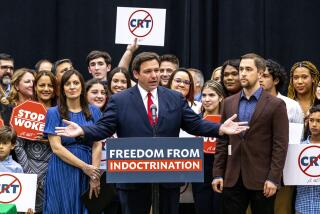Pre-inaugural books on civics for history geeks
You’re not necessarily a history geek if you shed a tear during Steven Spielberg’s excellent biopic “Lincoln,” which relates the struggle to pass the 13th Amendment to the Constitution and forever outlaw slavery.
However, you are most certainly a history geek if you cry during the film’s opening 15 minutes, when President Lincoln, played by Daniel Day-Lewis, listens to three young Union soldiers recite the Gettysburg Address back to him. That happened to me, Hector Tobar, proud U.S. history geek.
Seeing those young men recite those words transported me to one of the happier moments of my own childhood: having to memorize and lead my classmates in the recitation of the Gettysburg Address at the age of 10. I was then a sixth-grader at Grant Elementary School in East Hollywood. Beyond the very republican (with a small R) ideas at the center of that short speech, its metaphors and cadences -- “a new birth of freedom” and “of the people, by the people, for the people” -- were among my earliest exposures to the idea of poetry in prose.
There are many more such wonderfully turned phrases -- calls to arms, to unity, for justice -- in “American Political Speeches,” Volume 5 in the excellent new series Civic Classics from Penguin Books, edited by Richard Beeman.
There are 40 speeches and speech fragments, from Patrick Henry’s cry of “Give me liberty or give me death,” to Lincoln’s second inaugural (the other big speech in “Lincoln”) and Ronald Reagan’s “tear down this wall” address in Berlin. There’s William Jennings Bryan and Martin Luther King Jr. too, and even Richard Nixon’s “silent majority” speech on Vietnam.
Perusing “American Political Speeches” is excellent preparation for Barack Obama’s second inaugural this month -- his not-so-memorable first inaugural is the final entry of “American Political Speeches.” (I would have included his much better speech on race in Philadelphia instead.)
The other, slender volumes in the Civic Classics series are also good additions to any home library, I think. I bought Volume 1, the annotated “The Declaration of Independence and the United States Constitution,” and used it recently to help my son do his homework. It has, by the way, a very lucid and pithy explanation of infamous “three-fifths of all other persons” clause by which slaves were to be counted for the apportionment of representatives in Congress.
Other books in the six-volume series include “Supreme Court Decisions” and “The Federalist Papers.” If you like the series enough, you might consider buying the T-shirt featuring some of the books’ cover art too, though I’m not sure I will -- my kids already think I’m too much of a history geek.
ALSO:
Great books that writers love to hate
John Steinbeck’s Nobel victory: Files unsealed; tongues wag
The Bernard Madoff book collection: Rick Moody, Fyodor Dostoevsky
More to Read
Sign up for our Book Club newsletter
Get the latest news, events and more from the Los Angeles Times Book Club, and help us get L.A. reading and talking.
You may occasionally receive promotional content from the Los Angeles Times.







